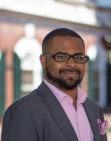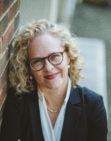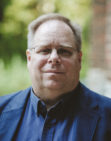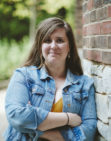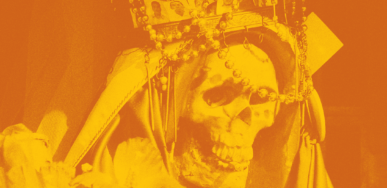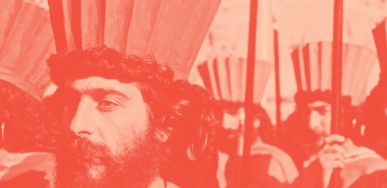
Martien Halvorson-Taylor: On our last episode, we heard from Jessie Marroquin, who brought the story of Santa Muerte—a saint who’s often held up as a symbol of Mexico’s violent cartels—from the perspective of a devotee...who sees her in a very different light.
Kurtis Schaeffer: Today, we’re bringing you another documentary by a UVA student as part of our ongoing series, Field Notes. Like Jessie’s reporting, this piece relies on first-person interviews. Jason Evans went to Philadelphia to report on how Black Lives Matter members both draw on their faith, and reject traditions of the black church. We’ll let Jason take it from here.
INTRO: (SOUNDS OF PROTEST AND POLICE SIRENS)
SHAKIRA: My cousin died. We’re actually coming up on his seventh
year anniversary, August 23rd. Um...I’m sorry; it’s still a little emotional...
JASON: THIS IS SHAKIRA KING.
SHAKIRA: ...and he was killed by the Philadelphia Police Department.
JASON: SHAKIRA IS A PHILADELPHIA-BASED ACTIVIST AND EDUCATOR.
SHAKIRA: ...And I was really angry and didn't know what to do with all the anger I had. And then I was just kind of going through the motions of grief and Mike Brown was killed. And I just. That was my tipping point.
So, I was in a group chat with some folks that I had met via the Internet…
JASON: PEOPLE IN THE GROUP CHAT TOLD SHAKIRA ABOUT PLANS FOR PROTESTING THE KILLING OF MICHAEL BROWN.
SHAKIRA: … And they were going to Ferguson and I wanted to go so bad but I was still fairly young. My mother was like, “No you're not going” [JASON: THIS WAS IN 2014?] Yes! I really wanted to go. They were organizing bus trips and caravans. There was actually a bus that left here from Philadelphia with some folks that I now have gotten really close with. And I was like I'm going. She was like, “No! Stay still!” And it hurt me to sit still.
JASON: SHAKIRA DIDN’T GO TO FERGUSON. BUT SHE DIDN’T SIT STILL. SHE JOINED A PHILADELPHIA-BASED GROUP OF ACTIVISTS WHO WERE COMMITTED TO MAKING A CHANGE IN THEIR LOCAL COMMUNITY.
SHAKIRA: I began to organize with folks on the ground on how to make sure these folks were lifted up who were there on the ground doing the work. And then when they came back they formed the chapter and I still wasn't fully ready to be fully engaged in the work partly because...I’m not gonna lie…some folks who maybe listening or who may have been wanting to get into activism may also share this right now, but it's intimidating to get into this kind of work when you feel like you're not fully informed. So, I took some more time to get really fully informed and I joined another group called Sankofa Community Empowerment and our focus was really on educating people so every meeting every week we took a different subject and we met and we broke it down and we talked about it. And then I met the two folks who were running Black Lives Matter at the time.
JASON: BLACK LIVES MATTER IS A MOVEMENT FOUNDED BY THREE BLACK WOMEN--ALICIA GARZA, PATRISSE CULLORS, AND OPAL TOMETI. IT BEGAN IN RESPONSE TO THE DEATHS OF TRAYVON MARTIN, ERIC GARNER, AND MICHAEL BROWN, AMONG MANY OTHERS. WHILE POLITICAL ACTIVISM IS CENTRAL, SO IS SPIRITUAL WELLNESS FOR THE COMMUNITY.
SHAKIRA: I met them and they were like come to this healing circle we have because we had had Joyce Quaweay at that point who was killed by her boyfriend who was the Temple [University] police officer and then we had Alton Sterling who also was killed at the time. And they had a letter writing campaign and in healing the whole that a healing space for us to kind of come together and they had mental health professionals that we could talk about the grief...
JASON: BUT UNLIKE THE CIVIL RIGHTS MOVEMENT OF THE 1960s, WHICH HAD STRONG TIES TO THE BLACK CHURCH, THE BLACK LIVES MATTER MOVEMENT IS NOT AFFILIATED WITH ANY ORGANIZED RELIGION.
SHAKIRA: They had spiritual practitioners who were there who were willing to pray and cleanse and there were all these different elements of how the liberation movement is moving forward.
JASON: MANY MEMBERS OF BLM GREW UP DEEPLY RELIGIOUS. BUT A LOT OF MILLENNIALS NO LONGER IDENTIFY WITH THE BLACK CHURCH.
JALANE: The founding of the organization was not connected to the Black Church.
JASON: THAT’S RELIGIOUS HISTORIAN AND BLACK LIVES MATTER ACTIVIST, JALANE SCHMIDT.
JALANE: Millennial African-Americans as with other, you know, their millennial peers...there's a higher portion of nones [N-O-N-E-S]. That is, folks who don't claim any religious affiliation. So that's a new kind of demographic fact that also plays in here, I think. And then there's been this tension actually between some black church leaders—some people who are more vocal about it—and Black Lives Matter...
JASON: ANOTHER SOURCE OF TENSION IS THAT THE BLM LEADERSHIP MODEL IS VASTLY DIFFERENT THAN THE CENTRALIZED, PREDOMINANTLY MALE, AND PROTESTANT MODELS OF THE CIVIL RIGHTS ERA.
JALANE: Black Lives Matter is trying to be, quote unquote leader-full, kind of more lateral in its arrangement of initiatives and organizational activities.
JASON: IN SHORT, BLM HAS MANY LEADERS, INCLUDING BLACK WOMEN, QUEER-IDENTIFIED AND TRANS PEOPLE.
MANY BLM LEADERS ARE INSPIRED BY THE BLACK WOMEN FREEDOM FIGHTERS WHO WENT LARGELY UNRECOGNIZED BY THEIR MALE COUNTERPARTS, INCLUDING FANNIE LOU HAMER, BARBARA JORDAN, ANGELA DAVIS, BARBARA SMITH, AND ELLA BAKER:
[ELLA BAKER SPEECH] - FRIENDS, BROTHERS AND SISTERS IN THE STRUGGLE FOR HUMAN DIGNITY AND FREEDOM. I HAVE HAD ABOUT FORTY OR FIFTY YEARS OF STRUGGLE EVER SINCE A LITTLE BOY ON THE STREETS OF NORFOLK CALLED ME A “NIGGER.” I STRUCK HIM BACK! AND THEN I HAD TO LEARN….
[RAUCOUS APPLAUSE]
JASON: SOME OF THESE WOMEN, LIKE ELLA HERSELF, HAD DIRECT TIES WITH THE BLACK CHURCH WHILE OTHERS HAD NO FORMAL RELIGIOUS AFFILIATION.
[ELLA SPEECH CONT’D]: I HAD TO LEARN THAT HITTING BACK WITH MY FIST ONE INDIVIDUAL WAS NOT ENOUGH. IT TAKES ORGANIZATION. IT TAKES DEDICATION. IT TAKES THE WILLINGNESS TO STAND BY AND DO WHAT HAS TO BE DONE WHEN IT HAS TO BE DONE.
JASON: BUT NO MATTER YOUR AFFILIATION, THE MOVEMENT AS A WHOLE WAS INFLUENCED BY TACTICS THAT CAME OUT OF THE BLACK CHURCH - TACTICS LIKE RESPECTABILITY POLITICS.
JALANE: So, Harvard historian Evelyn Brooks Higginbotham coined this phrase “the politics of respectability” to speak about the Black Women's Club movement of the early 20th century. You know “Lifting as we climb” was kind of the mantra…
JASON: CIVIL RIGHTS LEADERS SAW RESPECTABILITY AS A POWERFUL POLITICAL AND MORAL STRATEGY IN THEIR STRUGGLE FOR RACIAL EQUALITY.
JALANE: You know let's wear coats and ties when we go out to protest, wearing our Sunday best, perfect diction, elocution, and all these kinds of markers of middle-class status and proper manners and...
I mean these were the wives of doctors and dentists and lawyers and funeral home directors and what there was in terms of middle-class status in the black community at that time.
and making the case tacitly and also explicitly for civic inclusion by having these sorts of markers.
JASON: MANY BLACK LIVES MATTER ACTIVISTS FIND THE RESPECTABILITY STRATEGY NOT ONLY OUTDATED, BUT ALSO STIFLING AND EXCLUSIONARY.
RESPECTABILITY MEANS CONFORMITY—CONFORMITY IN DRESS, CONFORMITY IN BEHAVIOR, AND ESPECIALLY CONFORMITY IN SEXUALITY. MANY BLACK WOMEN LIKE SHAKIRA GREW UP IN THE CHURCH LISTENING TO MESSAGES THAT DENOUNCED THEIR SEXUALITY.
SHAKIRA: I attended a very conservative Baptist Church here in Philadelphia and it was my family’s church. And you know folks had very strict beliefs. On you know what folks’ roles were, what women's roles were. I'm a black queer woman proudly and I struggled with my queer identity and all of my life because I knew that
What I had been taught was that I was going to go to hell and that God no longer loved me because of how I because of how and who I loved. As I grew older, I stepped away from the church because of that because it didn't feel right.
JASON: SHAKIRA NEVER THOUGHT SHE WOULD RETURN TO THE BLACK CHURCH. BUT IN THE SUMMER OF 2017, SHAKIRA WAS HIRED BY ST. PAUL’S BAPTIST CHURCH TO BECOME A TEACHER IN THE CHURCH’S FREEDOM SCHOOL, A LITERACY PROGRAM DESIGNED TO UPLIFT BLACK AND BROWN CHILDREN.
ST PAULS IS A RARITY IN THE BLACK CHURCH. DESPITE THE FACT THAT MOST BLACK CHURCHES ARE COMPRISED OF BLACK WOMEN, VERY FEW ARE LED BY WOMEN.
ST. PAUL’S BAPTIST CHURCH WAS FOUNDED IN 1890 BY TWO BLACK WOMEN--FRANCES FIELDS AND MARY HENRYHAND. AND CURRENTLY, MOST OF THE LEADERS OF THE CHURCH ARE WOMEN—INCLUDING THE ASSISTANT PASTOR, CHARISSE TUCKER:
CHARISSE: Black women have been a part of movements. That's not new.
JASON: FROM THE PULPIT, CHARISSE CAN SEE THAT BLACK WOMEN ARE LEADING THE FIGHT FOR BLACK FREEDOM.
CHARISSE: I think what is unique in this moment is that we're saying, “we don't want to work and we takin’ the mic. No, we will not write the script and pass it on to you to read in front of the cameras. We got it! We got the mic. That's all right. We good!” And it's not to exclude the participation of men or to exclude participation of others who are also working toward justice also working toward the thriving of black people in black communities or other communities that have been marginalized for a host of reasons What I think what we're seeing is women saying, “no more will I bear the load and pass the reward for you to get it.” And I think that's why it looks so different.
JASON: IN THE STRUGGLE FOR BLACK FREEDOM, BLACK WOMEN ARE LEADING THE WAY, AND DETERMINING FOR THEMSELVES WHAT THE BLACK LIVES MATTER MEANS.
MUSIC [“DETERMINATION”].
SHAKIRA: Black lives matter means…
JALANE: So black lives matter means...
CHARISSE: It means that our lives matter.
JALANE: ...highlighting black lives and the way that we’ve been subjected to dehumanization….
CHARISSE: ...that our wellness matters, that our hopes matter, that our thriving matters that our health matters
JALANE: Treasuring and promoting the full humanity of black people.
CHARISSE: that our survival matters, that our futures matter, that our children matter, that our concerns matter. And its mattering means it gets to be taken seriously, it gets to be paid attention to, it gets to be the center of the conversation and it is worthy of resources and strategies and support and room.
SHAKIRA: Black lives matter means...liberation in community. And healing in
community. That’s our goal.
CHARISSE: That’s it. No more explanation.
Kurtis Schaeffer: This project was funded by the Race, Religion, and Democracy Lab at the University of Virginia. It was created by Jason Evans.
Ashley Duffalo is our communications manager. Our senior producer is Emily Gadek. Kelly Jones is the lab’s editor.
Martien Halvorson-Taylor: Next week, we’ll be returning with a full length episode of Sacred & Profane. Stay tuned.
We’re returning to our series Field Notes with a piece from graduate student Jason Evans, exploring how black women—leaders of the Black Lives Matter movement since the beginning—are shaped by their faith, even as they question many aspects of the traditional black church. This project was reported as part of the Religion, Race & Democracy Lab’s ongoing documentary grant program.
In 2013, Black Lives Matter (BLM) began after the acquittal of George Zimmerman, the acquitted killer of 17-year-old Trayvon Martin in Sanford, Florida. Three queer-identified Black women—Alicia Garza, Patrisse Khan-Cullors, and Opal Tometi—delivered a call to action on social media using the hashtag #BlackLivesMatter to end police brutality and systemic anti-black racism. In 2014, the movement solidified as activists protested the police killings of Michael Brown in Ferguson, Missouri and Eric Garner in New York City. Across the world, thousands gathered and protested in solidarity with the activists of Ferguson. Consequently, Black Lives Matter has grown into an international movement that addresses a variety of issues that impact Black lives including racial inequity, mass incarceration, systemic violence, and economic injustice, among others.
In addition, BLM distinguishes itself from its forebears in the U.S. Civil Rights Movement Era as a decisively non-sectarian movement. In other words, many BLM activists are not affiliated with any organized religion unlike many of the members of the Civil Rights Movement who were predominantly Protestant Christians. Moreover, BLM is a decentralized network of smaller organizations and contains no formal hierarchy, a striking contrast with the centralized, patriarchal, and charismatic leadership style of the Civil Rights Movement. BLM leadership is inclusive of Black people of all gender identities, expressions, and sexualities and seeks to dismantle all interlocking systems of racial, gender, and sexual oppression. Consequently, BLM activists reject the patriarchy, sexism, queer-antagonism, and transphobia found in many African American Christian communities.
Despite the growing number of religious “Nones” in the movement, some BLM activists maintain affiliation with the religious traditions of their youth. During the summer of 2019, I interviewed three Black women who live on the intersection of race, gender, sexuality, and religion. During the interview, these women shared their stories and perspectives on the contributions of Black women in the Black freedom struggle and Black Lives Matter. Shakira King is a Philadelphia-based activist and educator. Shakira shares her story of how she became involved with the Philadelphia chapter of Black Lives Matter and reflects upon her upbringing as a Black queer woman in the Black Baptist Church. Jalane Schmidt is Associate Professor of Religious Studies at the University of Virginia and co-founder of the Charlottesville chapter of Black Lives Matter. Professor Schmidt offers a historical perspective on BLM and the Black freedom struggle. The Reverend Charisse R. Tucker is Minister of Administration at St. Paul’s Baptist Church in Philadelphia, Pennsylvania. As the assistant pastor of a 130-year-old Black Baptist congregation, Tucker reflects on her own journey into ministry and the leadership of Black women in both the Black Church and social-political movements.
How to cite this episode:
Halvorson-Taylor, M., Schaeffer, K. (Presenters), Evans, J. (Reporter), & Gadek, E. (Producer). “Field Notes: Black Lives Matter.” Sacred & Profane (2020, May 11).
Additional Reading
Douglas, Kelly Brown. Stand Your Ground: Black Bodies and the Justice of God. Maryknoll, NY: Orbis Books, 2015.
Gilkes, Cheryl Townsend. “If it Wasn’t for the Women…”: Black Women’s Experience and Womanist Culture in Church and Community. Maryknoll, NY: Orbis Books, 2000.
Khan-Cullors, Patrisse and asha bandele. When They Call You a Terrorist: A Black Lives Matter Memoir. New York, NY: St. Martin’s Press, 2018.
Lebron, Christopher L. The Making of Black Lives Matter: A Brief History of An Idea. New York, NY: Oxford University Press, 2017.
Lightsey, Pamela R. Our Lives Matter: A Womanist Queer Theology. Eugene, OR: Wipf and Stock, 2015.
Ransby, Barbara. Ella Baker and the Black Freedom Movement: A Radical Democratic Vision. Chapel Hill, NC: The University of North Carolina Press, 2005.
———. Making All Black Lives Matter: Reimagining Freedom in the Twenty-First Century. Oakland, CA: University of California Press, 2018.
Taylor, Keeanga-Yamahtta. From #BlackLivesMatter to Black Liberation. Chicago, IL. Haymarket Books, 2016.
Additional Credits
(Top banner)
“Demilitarize the Police, Black Lives Matter, November 10, 2015” by Johnny Silvercloud is licensed under CC BY-SA 2.0.


